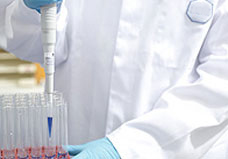| |
 |
|
|
|
|
|
|
Pneumonia |
|
|
What Is Pneumonia?
Pneumonia is an inflammation or infection of the lungs most
commonly caused by a bacteria or virus. Pneumonia can also be
caused by inhaling vomit or other foreign substances.In all cases,
the lungs' air sacs fill with pus , mucous, and other liquids and
cannot function properly. This means oxygen cannot reach the blood
and the cells of the body.
Types of pneumonia
Most pneumonias are caused by bacterial infections.
-
The most common infectious
cause of pneumonia in the United States is the bacteria
Streptococcus pneumoniae.
-
Other bacteria, as well as
certain viruses, may also cause pneumonia. Since these
infections may not cause all of the classic pneumonia symptoms,
they are often called "atypical pneumonias."
-
Aspiration (or inhalation)
pneumonia is a swelling and irritation of the lungs caused by
breathing in vomit, fumes from such chemicals as bug sprays,
pool cleaners, gasoline, or other substances. This kind of
pneumonia cannot be spread to other people.
What
Causes Pneumonia?
There are about 30 different causes of pneumonia. However, they
all fall into one of these categories:
-
Infective pneumonia:
Inflammation and infection of the lungs and bronchial tubes that
occurs when a bacteria (bacterial pneumonia) or virus (viral
pneumonia) gets into the lungs and starts to reproduce.
-
Aspiration pneumonia: An
inflammation of the lungs and bronchial tubes caused by inhaling
vomit, mucous, or other bodily fluids. Aspiration pneumonia can
also be caused by inhaling certain chemicals.
How Is
Pneumonia Treated?
Treatment depends on the cause and severity of the
pneumonia. Antibiotics are used to treat bacterial pneumonia but
are ineffective against viral pneumonia.
Treating Infective Pneumonia
Although the treatment for infective pneumonia depends on the
cause of the condition, some simple steps can help speed recovery
from pneumonia:
-
Medications should be taken
exactly as prescribed by a physician. If it is not helping, call
the doctor. Do not quit taking it unless told to do so by a
doctor.
-
Take over-the-counter
medicines such as acetaminophen or ibuprofen to help control
pain and fever.
-
Use a cool-mist humidifier or
vaporizer to increase air moisture and to make it easier to
breathe. DO NOT use hot steam.
-
Rest in bed until body core
temperature returns to normal and chest pains and breathing
problems are gone. Drink six to eight glasses of liquids daily
to help keep mucous thin and easy to cough up.
|
|
|
|
Pneumonia - treatment of Pneumonia, Pneumonia
types, Disease medicines, Pneumonia symptoms, Pneumonia and Disease
symptoms, Pneumonia symptoms Disease and diagnosis, Symptoms and Solutions,
Signs and Symptoms, type of Pneumonia, cause common, common Pneumonia,
Pneumonia List, causes list, Infectious Pneumonia, Causes, Diseases , Types,
Prevention, Treatment and Facts, Pneumonia information, Pneumonia:
Definition, Pneumonia names, medical Pneumonia, medical Pneumonia and
disorders, cell Pneumonia, Pneumonia Worldwide, Pneumonia Research,
Pneumonia Control, Pneumonia Center, Digestive Pneumonia Week, Information
about Pneumonia, causes of different Pneumonia, Pneumonia Articles,
Pneumonia and conditions, Health and Pneumonia, Pneumonia Patients,
Pneumonia and Sciences, causes of alzheimer's Pneumonia, Pneumonia causes,
alternative medicine heart Pneumonia, body ailments, Pneumonia medicines,
medical antiques, type of blood Pneumonia |
|
|





